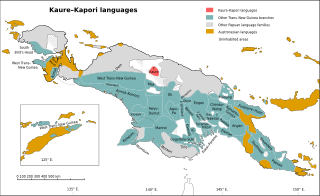Related Research Articles
The Sko or Skou languages are a small language family spoken by about 7000 people, mainly along the Vanimo coast of Sandaun Province in Papua New Guinea, with a few being inland from this area and at least one just across the border in the Indonesian province of Papua.

The East Geelvink Bay or East Cenderawasih languages are a language family of a dozen Papuan languages along the eastern coast of Geelvink Bay in Indonesian Papua, which is also known as Sarera Bay or Cenderawasih.
The Lakes Plain languages are a family of Papuan languages, spoken in the Lakes Plain of Indonesian New Guinea. They are notable for being heavily tonal and for their lack of nasal consonants.

The Sepik or Sepik River languages are a family of some 50 Papuan languages spoken in the Sepik river basin of northern Papua New Guinea, proposed by Donald Laycock in 1965 in a somewhat more limited form than presented here. They tend to have simple phonologies, with few consonants or vowels and usually no tones.

The South Halmahera–West New Guinea (SHWNG) languages are a branch of the Malayo-Polynesian languages, found in the islands and along the shores of the Halmahera Sea in the Indonesian province of North Maluku and of Cenderawasih Bay in the provinces of Papua and West Papua. There are 38 languages.
Golin is a Papuan language of Papua New Guinea.
Bukawa is an Austronesian language of Papua New Guinea.
Iau or Turu is a Lakes Plain language of West Papua, Indonesia, spoken by about 2,100 people, native speakers of this language are the Turu people (Iau). Most speakers are monolingual, and their number is growing. Other peoples in the western Lakes Plain area speak basic Iau. Iau is heavily tonal, with 11 tones on nouns and 19 simple and compound tones on verbs.

The Chimbu–Wahgi languages are a language family of New Guinea. They are sometimes included in the Trans–New Guinea proposal; Usher links them with the Engan languages in a Central New Guinea Highlands family.
Momuna (Momina), also known as Somahai, is a Papuan language spoken in Yahukimo Regency, Highland Papua and Asmat Regency, South Papua, Indonesia.
Telefol is a language spoken by the Telefol people in Papua New Guinea, notable for possessing a base-27 numeral system.
Mian is an Ok language spoken in the Telefomin district of the Sandaun province in Papua New Guinea by the Mian people. It has some 3,500 speakers spread across two dialects: West Mian, with approximately 1,000 speakers in around Yapsiei, and East Mian, with approximately 2,500 speakers in and around Timeilmin, Temsakmin, Sokamin, Gubil, Fiak and Hotmin.

Wiru or Witu is the language spoken by the Wiru people of Ialibu-Pangia District of the Southern Highlands Province of Papua New Guinea. The language has been described by Harland Kerr, a missionary who lived in the Wiru community for many years. Kerr's work with the community produced a Wiru Bible translation and several unpublished dictionary manuscripts, as well as Kerr's Master's thesis on the structure of Wiru verbs.
Mpur is a language isolate spoken in and around Mpur and Amberbaken Districts in Tambrauw Regency of the Bird's Head Peninsula, New Guinea. It is not closely related to any other language, and though Ross (2005) tentatively assigned it to the West Papuan languages, based on similarities in pronouns, Palmer (2018), Ethnologue, and Glottolog list it as a language isolate.
Abun, also known as Yimbun, Anden, Manif, or Karon Pantai, is a Papuan language spoken by the Abun people along the northern coast of the Bird's Head Peninsula in Sausapor District, Tambrauw Regency. It is not closely related to any other language, and though Ross (2005) assigned it to the West Papuan family, based on similarities in pronouns, Palmer (2018), Ethnologue, and Glottolog list it as a language isolate.

Pawaia, also known as Sira, Tudahwe, Yasa, is a Papuan language that forms a tentative independent branch of the Trans–New Guinea family in the classification of Malcolm Ross (2005).
Keuw is an unclassified language of New Guinea.

Kaure is a Papuan language of West Papua. It is spoken in the villages of Lereh, Harna, Wes, Masta, and Aurina.
Skou, or Tumawo, is a Papuan language of Indonesia.
Obokuitai (Obogwitai) is a Lakes Plain language of Papua, Indonesia. It is named after Obogwi village in East Central Mambermano District, Mamberamo Raya Regency.
References
- ↑ Baropasi at Ethnologue (18th ed., 2015) (subscription required)
- 1 2 3 Foley, William A. (2018). "The languages of Northwest New Guinea". In Palmer, Bill (ed.). The Languages and Linguistics of the New Guinea Area: A Comprehensive Guide. The World of Linguistics. Vol. 4. Berlin: De Gruyter Mouton. pp. 433–568. ISBN 978-3-11-028642-7.